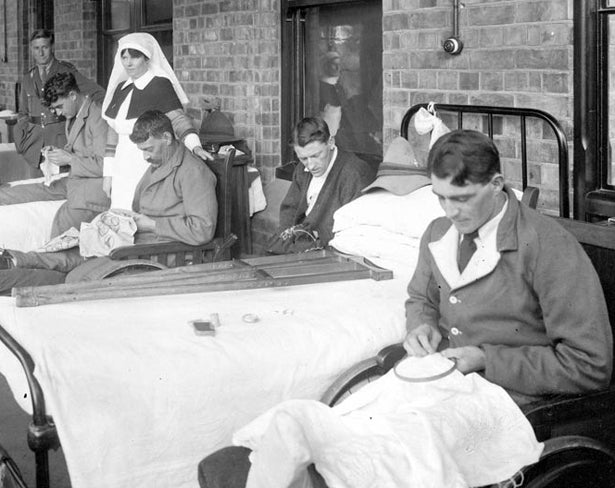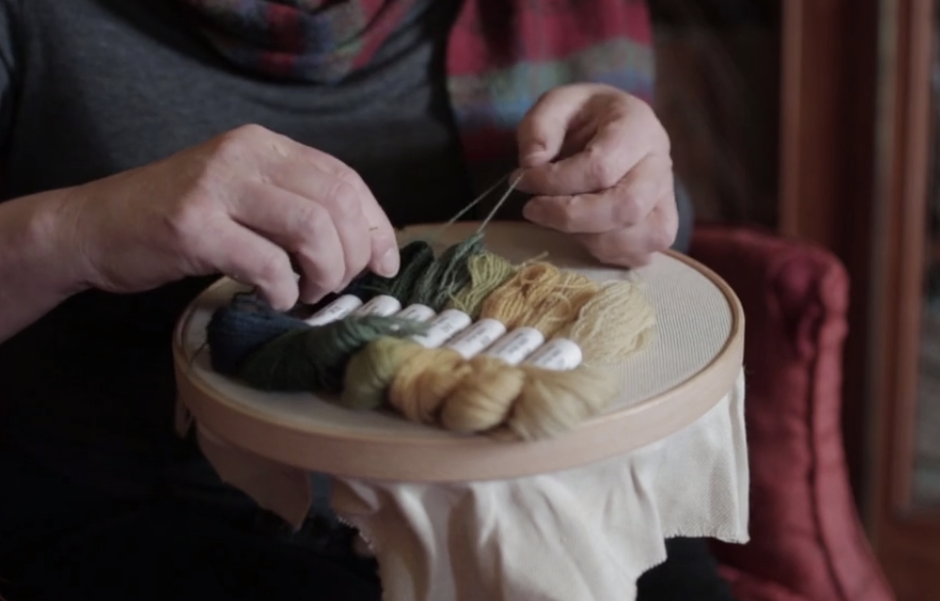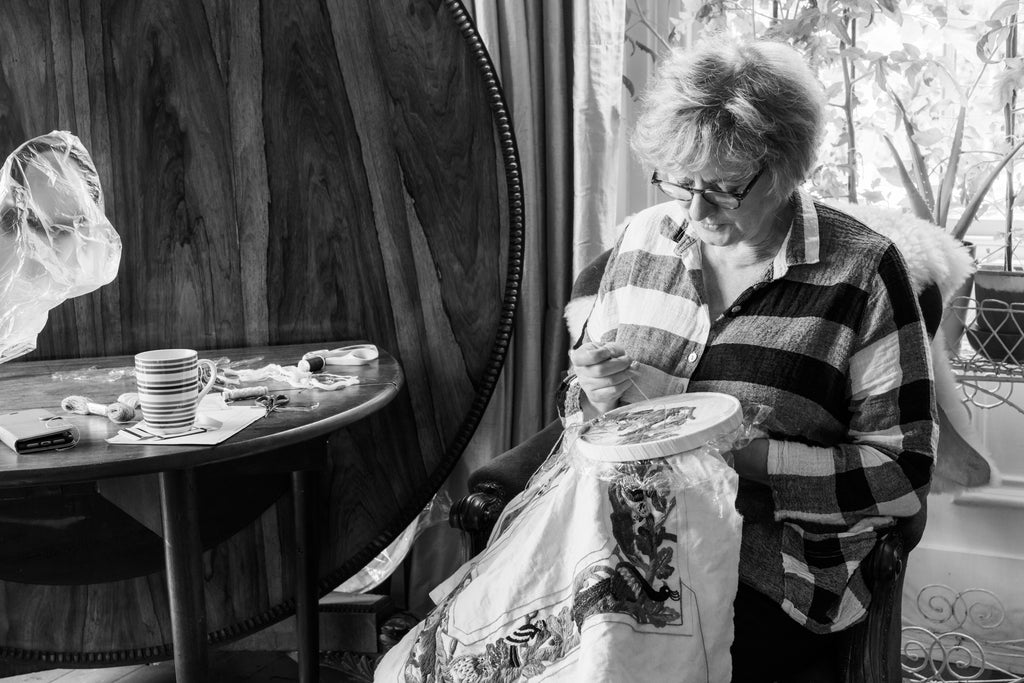In a society where technology is king, with everything from the weekly shop to reading the latest thriller possible to achieve on a machine, it’s hardly surprising that mindfulness is having a bit of a moment. We all struggle at some point in our lives with mental health, be it dealing with a major life transition or just getting through the everyday things that feel like they should have been easy but somehow were not.
As we remember World Mental Health Day this October, we wanted to spend a moment with you and draw attention to how many people find a path out of the fog through needlework.
Mindfulness is defined by the Cambridge Dictionary as “the practice of being aware of your body, mind and feelings in the present moment, thought to create a feeling of calm”.
This calm that comes from practising mindfulness is said to have numerous benefits to mental health and along with drawing and colouring in, needlework is brilliant for promoting and achieving it.
The link between mental health and stitching is not a new discovery. Historically, stitching has helped varying demographics in a range of circumstances overcome or ease psychological trauma.
First world war veterans in the UK, Australia and New Zealand practiced needlework as a form of therapy for shell shock. Soldiers called embroidery “fancy work” and the subject matter ranged from rural landscapes to flags and heraldry or simply, and perhaps most touchingly, decorative pieces for their parents or sweethearts.
Soldiers found such solace in practicing embroidery that an entire organisation was set up to help disabled veterans return to the workforce by producing domestic and luxury textiles. The Disabled Soldiers’ Embroidery Industry was in operation between 1918 and 1955.

These days, stitching is at least a hobby, at most a career and always a passion. It fulfils us creatively and is, on a base level a means to a beautiful end. But the journey – the making – can benefit all of us in ways we don't expect.
The NHS now recommends practising mindfulness – as well as other things – as a means of improving stress, anxiety and depression.
There is also an entire effort dedicated to mindful stitching. The Slow Stitching Movement, launched by US quilting expert Mark Lipinski, seeks to help people focus on creativity in a too-fast world, heal you emotionally and enhance your physical health and allow you to see what you create as a legacy.
“As a society, we are so burnt out,” says Psychologist Emma Kenny. “We need to release our anxiety but we also feel that we need to have something to show for that. Crafts like embroidery enable us to zone out and tap into something good for us. It connects you with something tribal and instinctive.”
The repetitive, rhythmic motions of stitching create a state of contentment and focus. “It actually alters brain chemistry,” says Kenny. “Levels of stress hormone cortisol get lower when we are focused on a creative task.”

The concept of focus is really important because it keeps the mind engaged on a task and less likely to be distracted by negative thought processes that fuel anxious or depressed minds. By remaining engaged, the mind cannot spiral.
Kenny also speaks of the importance of cultivating patience, and how embroidery art therapy can help with that. “The gift of patience is patience,” she says. “We live in a world of immediacy but embroidery is about cultivating absolute patience. Some embroideries can take years. But the ability to be patient with yourself and with the world is so good for wellbeing.”
Embroidery, as well as other needlework, offers a sense of community, even for those of us who live alone or in remote areas. Of course, in cities you’ll find easily accessible groups but there are numerous online forums and groups, not to mention social media pages you can follow to share tips, stories and a feeling of a common ground with others. This sense of connection has huge benefits to our mental health in a world where over 9 million people in the UK – almost a fifth of the population – say they are always or often lonely.
The physical act of stitching also means we cannot dither around online, being sucked into social media rabbit holes. Nor are we watching television. This screen-free time is immensely important to our sense of wellbeing. When we employ mindful stitching, we are also making time for ourselves. This is crucial, especially for the perpetually busy.

For those of us with depression, the creative side of embroidery provides a sense of accomplishment that the illness can brutally strip away. Even if it’s just a few stitches a day, it’s progress. And progress is synonymous with growth, which means the unwelcome beasts of depression, the exhaustion, inexplicable shame or fear of stagnation to name a few, are shown the door.
By making something – no matter how slowly - and no matter to what standard, there’s a sense of development and movement.
Embroidery also channels negative energy, converting it into something positive. It’s calming. It offers serenity. “Embroidery is brilliant for depression because it allows you to have something to show for your time,” says Kenny. “So even though it could be small, when you hold something in your hand that you have made it is a symbol of value. It says ‘you have value’. It says ‘this is something I have made’. The thing about depression is that motivation is the enemy. In a western world when we don’t often see the fruits of our labour unless we’ve got a big house, for example, creating something is a momentary miracle, enough to start motivating you.”
More and more people who seek help for drug and alcohol abuse find that their therapists advise that they take up a creative hobby. Therapists often advise those battling drug and alcohol addiction to take up a craft, especially needlework, knitting or crochet.
“It’s about filling an empty space,” says Emma Kenny. “It’s about finding a new talent. The thing about finding a talent and being able to cultivate that talent is first of all, it surprises you. Most people who are taking drugs or drinking too much booze are seeking something – a feeling. Something like embroidery creates a healthy habit. It shows that you can turn your addiction around. All the negative feelings you get after drinking or doing drugs – you get the opposite when you are creating. You get the same cycle but at the end of it you feel uplifted and valuable and powerful.”
"Embroidery has helped me at so many stages in life. I have used it to bring peace, find friends, gain confidence, make a life. It seems like such a trivial activity but it has been the constant in my life that I've been able to hang so many positive experiences on. So do it, do it for yourself, give yourself permission"
So, if your heart or mind feels heavy, you could do a lot worse than threading a needle…
--------------------------------------------------------------------------------------------
If you, or you know anyone suffering from mental health problems, the following resources are a start to a new path -
Global
Check worldwide resources at Checkpoint
UK
Search resources at NHS Support UK
Or visit the Mental Health organisation Time to Change
For local needlework groups, find a brand of your local Embroiderer's Guild
Australia
Search resources at Mental Health Australia
Find a local needlework group through MeetUp or the Embroiderer's Guild
USA
Search resources at Mental Health America
Tips for affordable Mental Health treatment
Find a local needlework group through Embroiderer's Guild of America or the American Needlepoint Guild
New Zealand
Search resources at The Mental Health Foundation of New Zealand
Find a local needlework group through ANZEG
General links





